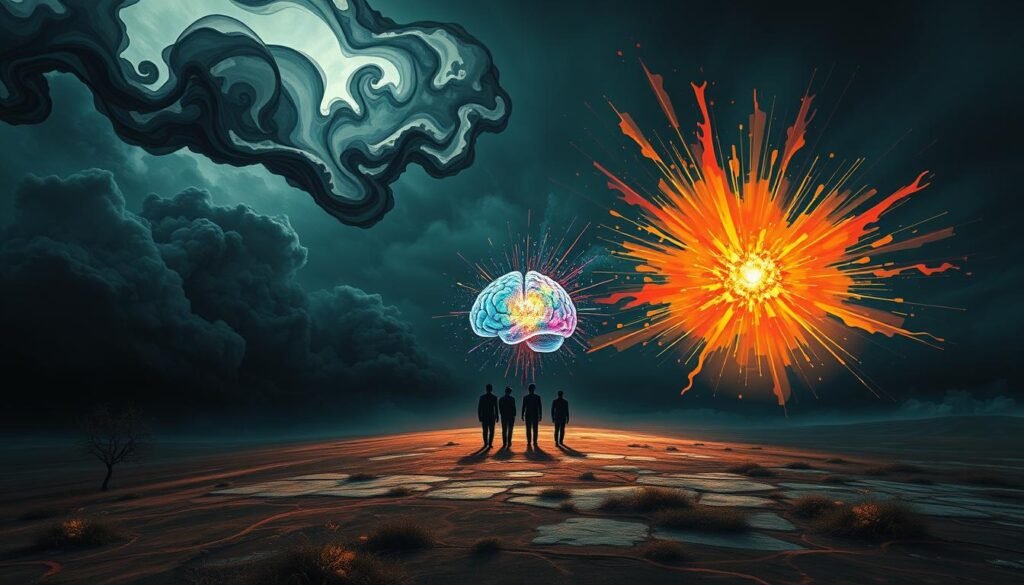About 12% of adult Americans live with social anxiety disorder (SAD). Shockingly, one-third to one-half don’t find relief from common treatments like SSRIs or cognitive behavioral therapy (CBT). This points out a big gap in effective treatments. Luckily, ketamine therapy has stepped into the spotlight. First made in the 1950s for anesthesia, ketamine is now known for its power to ease anxiety in those who haven’t had success with other treatments. We’ll look at how ketamine, originally an anesthetic, has become a new hope for anxiety therapy, including how it works and how to get it.
Key Takeaways
- 12% of adult Americans are impacted by social anxiety disorder.
- One-third to one-half of SAD patients receive little benefit from standard treatments.
- Ketamine shows promise in treating anxiety, providing a response where traditional methods fail.
- Initial studies indicate significant reductions in anxiety symptoms following ketamine infusions.
- Ketamine’s rapid effects can last from 1 to 2 weeks after treatment.
- Medical supervision is essential due to potential side effects associated with ketamine.
Introduction to Ketamine Therapy
Ketamine therapy is a new hope for treating mood disorders. It’s known for quick results in fighting anxiety, especially when other medicines fail. This approach has shifted how we view mental health treatment.
Traditional meds for anxiety can take weeks to work. This leads people to look for faster solutions. Ketamine therapy works fast, offering relief in minutes. For those struggling with anxiety, it can be a game-changer.
Ketamine-assisted psychotherapy (KAP) is exploring new ways to help. It involves taking ketamine in different forms like lozenges, nasal sprays, or injections. KAP has helped people achieve breakthroughs faster than traditional therapy.
As we seek new methods for mental health care, ketamine therapy shows promise. It’s pioneering a shift in treating anxiety disorders that resist other treatments. This gives new hope to those in need.
The Evolution of Ketamine in Medicine
Ketamine’s history is a compelling story from start to present. It was first made in 1956 and by 1970, it was used as an anesthetic. It quickly became popular for human and animal surgeries. During the Vietnam War, ketamine was used to help soldiers with pain.
Development as an Anesthetic
At first, doctors used ketamine to make patients sleep during surgery. It was safe and worked quickly. In the 1990s, scientists started to look at how ketamine could help with mental illnesses like schizophrenia. This was a new chapter for ketamine.
Transition to Mental Health Treatment
Researchers thought ketamine might help with more than just surgery. In 2019, a version called esketamine got FDA approval. It was a breakthrough for treating depression. Now, ketamine is seen as a way to treat serious mental health issues.
Understanding Anxiety and Its Treatment Options
Anxiety disorders are common mental health issues. Many people feel too much worry or fear. Knowing about anxiety and how to treat it can help explore options like ketamine treatment.
Common Types of Anxiety Disorders
Anxiety disorders include several conditions. These are:
- Generalized Anxiety Disorder (GAD): This is when anxiety lasts for at least six months.
- Panic Disorder: This includes sudden panic attacks with intense fear.
- Social Anxiety Disorder: This means a strong fear of social situations.
People with these disorders may feel shaky, tired, or sick. These physical signs make everyday life harder.
Traditional Treatment Approaches
Usual treatments for anxiety include talking to a therapist and medication. SSRIs are common but can be slow to work. Every year, about 19.1% of adults in the U.S. with anxiety find these methods not enough.
Some look for other ways, like holistic treatments, to feel better faster.
Ketamine treatments have become more accepted for those tough cases. Research says 70% of patients see progress with ketamine. This shows the importance of new treatment options in mental health.
| Type of Anxiety Disorder | Lifetime Prevalence in U.S. Adults |
|---|---|
| Generalized Anxiety Disorder (GAD) | 3.1% |
| Panic Disorder | 4.7% |
| Overall Anxiety Disorders | 19.1% |
What is Ketamine for Anxiety?
Ketamine for anxiety is getting lots of focus as a new alternative therapy. It helps people with hard-to-treat anxiety. Unlike common anxiety treatment choices like SSRIs that take a while to work, ketamine provides quick symptom relief.
This medicine works by targeting the body’s glutamate system. It brings fast relief, often within hours. Studies support its use. They show big improvements in those with generalized anxiety disorder (GAD) and social anxiety after just a few sessions. Surprisingly, the positive effects can last for up to a week, helping people get back to their usual routines.
The FDA has cleared ketamine as an anesthetic. Its relative, esketamine, is approved for tough cases of depression. But, ketamine is also being looked at for treating various anxiety disorders. Research indicates intravenous ketamine therapy makes a big difference for those not helped by standard treatments, giving many new hope.
Some side effects like confusion and dizziness have been reported. But, these usually depend on how much is taken and the person’s own health. Even though ketamine is an exciting new option for anxiety treatment, it’s key to talk with doctors to see if it’s right for you.
How Ketamine Works in the Brain
Learning how ketamine affects the brain is key to understanding its role in treating anxiety. It works with glutamate, which is important for mood control. By boosting glutamate, ketamine can help form healthier ways of thinking and feeling.
The Role of Glutamate in Mood Regulation
Glutamate acts as a crucial neurotransmitter for brain functions that affect our mood and actions. Studies show that ketamine changes glutamate levels. This change improves how brain cells connect, leading to better control of emotions and less anxiety.
Neuroplasticity and Its Importance
Neuroplasticity is the brain’s ability to change and make new connections. Ketamine helps this process, breaking cycles of negative thoughts. This change helps people create positive mental habits, increasing their ability to cope with anxiety. Thanks to ketamine, many see a real boost in their emotional health.
| Aspect | Ketamine Effects | Implications for Anxiety |
|---|---|---|
| Glutamate Modulation | Increases neurotransmitter activity | Enhances mood regulation |
| Synaptic Connectivity | Strengthens synaptic connections | Supports cognitive restructuring |
| Neuroplasticity Enhancement | Facilitates rewiring of neural pathways | Enables disruption of negative thoughts |
Types of Ketamine Treatment for Anxiety
Ketamine treatments for anxiety include different methods. Each one has its own benefits and challenges. You can choose from IV infusions, IM shots, nasal sprays, or sublingual tablets. Knowing about these can help you choose the best one for your treatment.
Intravenous (IV) Ketamine Infusions
IV ketamine goes right into the bloodstream through an IV line. It works fast and can quickly ease anxiety symptoms. You usually get six infusions over three weeks, with each session lasting about 40 minutes. After the treatment, doctors watch you for two hours for any side effects.
Intramuscular (IM) Shots
IM shots are another way to get ketamine therapy. This method involves injecting the medication into a muscle. It works fairly fast. While it’s not as common as IV treatment, IM shots are easier for some and done in a clinic. But, the effects might show up slower than IV ketamine.
Nasal Sprays and Sublingual Tablets
Esketamine nasal sprays have changed ketamine treatments a lot. The FDA approved it in 2019 for tough-to-treat depression. You use it twice a week at first, then once a week after four weeks. Most people see their symptoms get better, with 63% feeling much less anxious or depressed after a few times. What’s great is you can use it at home. It costs between $200 and $250 each time.

| Method | Administration | Duration | Frequency | Observation Time |
|---|---|---|---|---|
| IV Ketamine | Intravenous Infusion | ~40 minutes | 6 infusions over 3 weeks | 2 hours |
| IM Shots | Intramuscular Injection | Varies | As prescribed | Varies |
| Nasal Spray (Esketamine) | Nasal Administration | Varies | Twice weekly first 4 weeks, then weekly | Varies |
Efficacy of Ketamine for Anxiety
Ketamine research is showing promise for treating anxiety disorders. Its effects can be felt within hours, unlike traditional meds that take weeks. Studies on ketamine have found it can greatly lower symptoms of anxiety, like in generalized anxiety disorder (GAD) and social anxiety disorder (SAD).
Research Findings and Studies
A review looked at about 14 randomized controlled trials (RCTs). Of these, 11 provided data for a meta-analysis. One study with 132 participants found ketamine had a significant immediate effect on anxiety. The effect was measured as standardized mean difference (SMD) = 1.1. Another check-up after 24 hours with 357 people found a lesser effect of SMD = 0.4. These results show ketamine is a promising option for severe anxiety treatment.
Comparative Effectiveness with Traditional Medications
Ketamine offers hope where typical antidepressants don’t work. About 30% to 40% of patients don’t get better with SSRIs or SNRIs. On the other hand, ketamine has helped those who haven’t responded to those treatments. It can provide relief for up to 14 weeks. This is a lot longer than the usual meds. Ketamine’s growing research suggests it could greatly improve anxiety treatment.
Potential Side Effects and Risks
Ketamine therapy can help with anxiety but it has side effects. It’s important to know these ketamine side effects. This helps make smart choices about using it.
Common Side Effects of Ketamine Therapy
Many patients experience various side effects during ketamine therapy. These can include:
- Nausea
- Dizziness
- Altered perception of surroundings
- Disorientation and confusion

If used for a long time, ketamine can cause serious problems. Ketamine-induced cystitis is one, leading to severe bladder issues. It can also hurt memory and focus with long-term misuse.
Precautions and Contraindications
Ketamine might help some people, but not everyone should use it. Those with substance use disorders or certain health issues are at greater risk. Checking contraindications first is crucial, like for those with high blood pressure.
There’s also a risk of becoming dependent on ketamine. A well-planned treatment is key to avoid withdrawal symptoms. These can include anxiety, agitation, and trouble sleeping.
Ketamine vs. Other Anxiety Treatments
Treatment options for anxiety have changed a lot, leading to an important ketamine comparison. Traditional methods, like SSRIs, can take a long time to work. Ketamine, however, can show effects in hours. This is big news for patients who haven’t found relief with standard treatments.
Ketamine works differently than SSRIs. It changes glutamate activity quickly, affecting mood. Studies show ketamine can make a big difference in anxiety levels. It has helped people with social anxiety cut their symptoms in half.
Ketamine has been effective for people with both social anxiety and GAD. About 60% of them felt better after using it. Some research suggests using it more regularly might improve results even more. Many people report feeling its benefits.
But, we need to think about all factors. While ketamine is promising, standard medicines are more accessible because insurance often covers them. The risks of ketamine, like addiction, are hurdles too. As people look for efficient treatments, the need for more research grows. It’s important to fully understand ketamine’s long-term impact.
How to Access Ketamine Therapy for Anxiety
Finding ketamine therapy needs careful thought, especially in picking a provider familiar with this treatment. It’s key for those seeking aid to find healthcare professionals skilled in using ketamine for anxiety.
Choosing a Qualified Healthcare Provider
Look for these things in a healthcare provider:
- Experience with Ketamine Therapy: Make sure the provider has a history of giving ketamine treatments for anxiety.
- Specialization in Mental Health: Providers should specialize in mental health to offer comprehensive care.
- Patient Testimonials: Read reviews to see how previous patients felt about their treatment.
- Integrative Approach: A provider that includes therapy or counseling might provide a better experience.
- Safety Measures: Learn about the safety steps taken during treatment to ensure a safe environment.
Best Practices for Finding a Ketamine Clinic
To find a suitable clinic, try these methods:
- Research Online: Search the web to find ketamine clinics nearby and read up on them.
- Consult Referrals: Talk to mental health experts for clinic recommendations.
- Check Credentials: Make sure the clinic is certified and licensed to meet healthcare requirements.
- Schedule a Consultation: Visit the clinic first to ask questions and understand their assessment process.
- Evaluate Treatment Plans: Check if the clinic offers personalized treatment and follows a suitable protocol.

By following these steps, people can find a ketamine clinic that fits their health needs. This helps them access ketamine therapy more smoothly. With ketamine treatment, many find relief from symptoms quickly.
Conclusion
Ketamine for anxiety is a new hope for those who haven’t found help with other treatments. Studies show it’s effective in reducing anxiety and depression. A study at 5 Azar Teaching Hospital found anxiety scores fell quickly after two weeks of treatment.
This therapy offers quick relief and helps the brain heal for the long term. It has lasting benefits, shown even months after treatment ends. So, ketamine could be a key option for those with chronic anxiety. More research will make its role in mental health clearer.
Knowing all treatment options, including ketamine therapy, is vital for those with anxiety. Ketamine can lead to a more stable life without anxiety. The good outcomes signal a breakthrough in managing anxiety, offering new hope for those struggling.